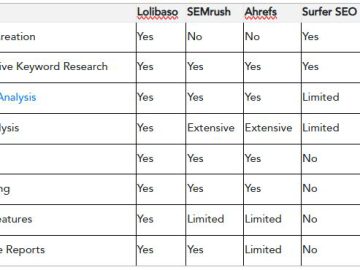SEO is a crucial aspect of the digital world that cannot be ignored. It encompasses everything related to online presence and visibility. Despite its importance, many people are still unfamiliar with what it entails, how it works and the do’s and don’ts for maximising its benefits. That’s why we’ve put together this guide on everything you need to know about SEO.
Creating high-quality content is pointless if it’s not reaching an audience. The most effective way to get your work seen by everyone is through the use of SEO.
Whether we love it or hate it, SEO is a necessary tool in our industry. So, we must all have a working knowledge of it if we want our work to gain attention on the Internet.
So, instead of searching through countless pages for information on SEO, keep reading because media update’s Saads Abrahams is going to tell you everything you need to know about SEO!
What is SEO?
Let’s start with the basics … Search engine optimisation, a.k.a. SEO is the process of improving your website to increase the traffic from search engines.
Essentially, when people search on a platform like Google or Safari for anything that can be found on your website — SEO can ensure that your site is right on top.
How SEO Works
So now that we know what it is, let me explain how it works.
In our world today, when people want to know absolutely anything or make a decision — their first stop is to type it into the search box of their search engine of choice. Now the question is, how do these search engines know what to pull up for you?
Through these four things:
- Rendering: Using information from HTML, JavaScript and CSS, search engines will generate how the page will look.
- Crawling: By using sitemaps and following links, search engines utilise crawlers to find pages on the Internet.
- Ranking: In order to decide if a page is relevant and is high enough quality to display when searchers input the search phrase, complex algorithms consider a number of signals.
- Indexing: Although not every page on your website will be indexed, search engines examine the metadata and content of the pages they find and add them to a database.
Types of SEO
There are also multiple types of SEO that you can make use of to make sure your website is getting to the first page of a search engine.
On-Page SEO
Your on-page SEO is probably the most common SEO strategy that is used. This refers to all the SEO happening on your website to optimise it for your viewers.
It includes:
- meta descriptions
- keywords
- page titles
- headings, and
- your URL structures.
Off-Page SEO
Off-page SEO involves all optimisations that don’t happen on your website. These are all external factors that influence it, such as:
- social media sharing
- content links
- reviews, and
- backlinks.
Technical SEO
The technical SEO is all optimisations on the backend of your website. This ensures that whenever anyone is on your site, it is an enjoyable experience.
These optimisations consist of:
- site speed
- mobile friendliness
- user experience, and
- crawlability.
Voice Search SEO
One of the newer search engine optimisations is voice search SEO — and this is because of devices like Alexa, Siri and Google Home.
To optimise this SEO, focus on:
- keywords
- slang words, and
- easily structured content.
Other Types of Specialised SEO
These other types of specialised SEO include:
- local SEO
- news SEO
- international SEO
- e-commerce SEO, and
- enterprise SEO.
Content and SEO
Content is and always will be king — and if you want your content to be right on top of the search pages, your content needs to be SEO-optimised. Depending on what your focus is on your site, you need to find out what people are asking for — and answer them.
Do thorough research on what people want to know and what keywords and phrases people are using. From there, answer those questions in your writing, and use the keywords and phrases that the people are using.
There are three main searches that people conduct:
- Navigational: The user wants to find a certain website.
- Informational: The user is trying to find out more about a certain subject.
- Transactional: The user wants to buy a good or service.
Keywords
There are two types of keywords when it comes to SEO:
- Short-tail keywords: These are search phrases that are made up of one to three words.
- Long-tail keywords: These are search phrases that are longer than three words.
Common SEO Mistakes
You may not realise it, but bad SEO practices can damage your site’s ranking and reputation. Luckily, they are avoidable.
These are some of the most common SEO mistakes:
- low-quality content
- duplicate content
- keyword stuffing
- toxic backlinks
- content spinning
- an over-optimised anchor text, and
- having too many adverts placed above the fold making your page “top-heavy”.
SEO Tools
When it comes to SEO, winging it won’t work — that is why investing in SEO tools is a must!
There are many different SEO tools out there, such as:
- SEO audit tools: This analyses the metrics of your SEO efforts.
- Keyword research tools: These will help you identify the best keywords you should use.
- Rank trackers: This tool will monitor how well your web pages or domains rank for individual keywords.
- All-in-one tools: These tools do everything and more, and have features such as automation and AI.
Measuring SEO Success
Finally, once you’ve put all of these SEO practices to use, you need to find out if they are successful or not. There are a few metrics you can use to track your SEO strategies, such as:
- keyword rankings
- organic traffic
- click-through rate (CTR)
- bounce rate
- returning visitors, and
- your domain authority.
Did you find this article helpful? Let us know in the comments section below.
Want to stay up-to-date with the latest news? Subscribe to our newsletter.
Looking for more on SEO? Take a look at SEO for Social Media — In 300 Words or Less
*Image courtesy of Canva
Everything You Need To Know About SEO SEO SEO tips What are SEO tools What are SEO Keywords Search Engine Optimization Search Engine Optimisation SEO guide How to improve website SEO





